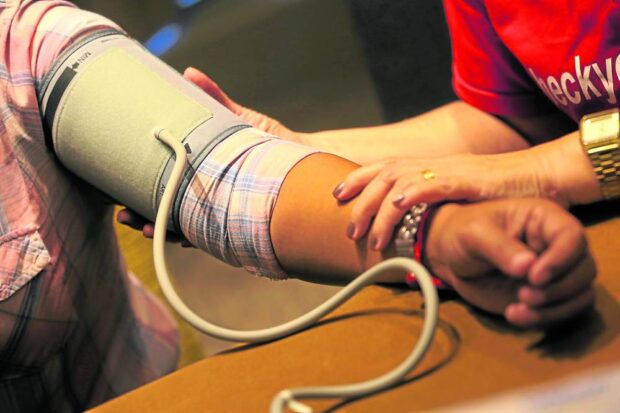
HEALTH RISK Around 80,000 registered and accredited barangay health workers were reportedly dismissed following the barangay and Sangguniang Kabataan elections. The Department of Health is presently asking Congress to pass a law that would provide them more benefits. —INQUIRER PHOTO
Party list Rep. Angelica Natasha Co on Friday urged newly elected barangay officials to reinstate the dismissed barangay health workers (BHW) in order to “remedy the damage” they’ve done to some 80,000 community health personnel who she said were terminated without due process after the Oct. 30 barangay and Sangguniang Kabataan elections (BSKE).
Meanwhile, the Department of Health (DOH) ordered its regional directors to look into the reported dismissal of the health workers and resolve the disputes arising from it.
In a memorandum dated Dec. 5, Director Lorra Sayson of the Bureau of Local Health Systems Development, an agency under the DOH, sought the support of the directors of the 17 Centers for Health Development across the country “in protecting all registered and accredited (barangay health workers) against unjust removal in (their) respective regions.”
Co, who represents the Barangay Health and Wellness party in Congress, said “the barangay captains need only rescind their termination of the barangay health workers’ services to solve this issue.” Such reinstatement would also “rectify the (officials’) violation” of a Joint Memorandum Circular (JMC) on barangay health workers, she added.
In a statement, Co reiterated that the unjust dismissal of 80,393 barangay health workers by newly elected barangay chairpersons “weakened the country’s primary health-care front lines” and compromised national public health and safety.
The figure represents 29 percent of the 270,407 barangay health workers registered as of 2023. Co earlier urged DOH Secretary Teodoro Herbosa to respond to the reported termination, which undermines the delivery of primary health-care services at the community level.
“Given the shortage of barangay health workers, the barangays should be adding barangay health workers, not removing the registered and accredited (ones), on whose training and service capability upgrades the DOH has spent billions of pesos over the years,” Co said.
Violations
The lawmaker had previously described the dismissals as violations of the JMC 2023-01 of the DOH and the Department of the Interior and Local Government issued in August.
On Friday, Co stressed that the JMC “provided for due process and steps to make sure the volunteer BHWs’ services are not unjustly terminated because of local politics and animosities.”
She pointed out that the barangay chair “does not have absolute power over the job security of barangay health workers,” who are already registered with the DOH and local government units.
Co added that as implementing regulations of the Universal Health Care Act, “the JMC has the force and effect of law,” and that “barangay captains are duty bound to enforce and observe all the country’s laws and regulations.” As such, “those who terminated the services of the BHWs have violated the JMC,” she said.
Co’s remarks came at the heels of the DOH’s representations before Congress, urging it to pass the Magna Carta for Barangay Health Workers that proposed to institutionalize their incentives and benefits, among them a monthly honoraria, hazard and transportation allowances, insurance coverage and mandated leave credits.
Sayson also pointed out that the DOH directive to its Centers for Health Development was in line with Section 6 of the JMC, which sets guidelines for the retention and continued service of barangay health workers. Aside from seeking help from DOH regional offices to investigate the BHWs’ termination, the directive also asked them to monitor the number of BHWs dismissed in their areas. Sayson asked the regional offices to submit a separate report as well on the dialogue they’ve held with the concerned local government units.
Under the JMC, the local health board is expected to “conduct an investigation, deliberate and resolve disputes related to (the circular).”
‘Blacklisted’
In a statement on its Facebook page on Thursday, the municipal health office of San Miguel, Bulacan—whose BHW were among those dismissed after the BSKE—said the health workers were “blacklisted” from accreditation next year, allegedly because of their participation as polling precinct watchers in the recent elections.
Others had decided to resign after their preferred candidates lost the elections, the statement said.
The blacklisted health workers violated Republic Act No. 7305, or the Magna Carta of Public Health Workers, as well as the rules of the Civil Service Commission, the municipal health office said.The office pointed out that Section 13 of RA 7305 states that public health workers “shall exercise his or her functions without consideration” to party politics, among others.
The Code of Conduct adopted by the Civil Service Commission also prohibits them from participating in any partisan political activity, it added.
READ: DOH speaks up for 80393 sacked health workers